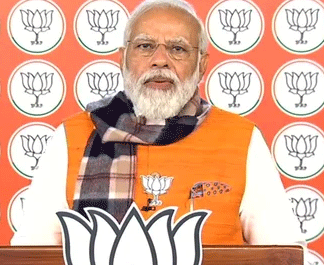From Our Bureau
NEW DELHI: Home Minister Amit Shah on Friday introduced in the Lok Sabha three new criminal laws to overhaul the laws of the British era in force in the country till todate. He also urged the Speaker to refer the new laws to the Parliamentary Standing Committee to examine them and present its report in Parliament at the earliest.
These laws will reform India’s criminal justice system in the country to “ensure justice to all and not punish under the British laws in practice till todate, by amending the Indian Penal Code of 1860, Code of Criminal Procedure, 1973 (as effective since the 1858 British law) and the Indian Evidence Act of 1972.
With the INDIA alliance of the Opposition boycotting the House, Shah had no difficulty in explaining the purpose behind the government bringing in three laws — Bharatiya Nyaya Sanhita, Bharatiya Suraksha Sanhita Bill and the Bharatiya Sakshya Bill to amend the Evidence Act.
“From August 16, the road from 75 to 100 years of Independence will begin. The PM had vowed to end the mindset of slavery. We will finish IPC (1857), CrPC (1858), Indian Evidence Act (1872) – which were made by the British. We will bring three new laws in their place to ensure the protection of rights. It will aim to give justice not punishment,” Shah said, adding that the government will end “475 signs of mentality of slavery in criminal laws”.
The Home Minister said: “The focus of the existing laws was to protect and strengthen the British administration, the idea was to punish and not to give justice. By replacing them, the three new laws will bring the spirit to protect the rights of the Indian citizen”.
“People are afraid of going to courts, they think going to courts itself is a punishment,” Amit Shah said.
Bharatiya Nyaya Sanhita will replace the Indian Penal Code. Earlier, there were 511 sections, it will now have 356 sections. 175 sections have been amended, Amit Shah said in the Lok Sabha. Bharatiya Nagarik Suraksha Sanhita will replace the Code of Criminal Procedure. Bharatiya Sakshya will replace the Indian Evidence Act.
SEDITION LAW: The controversial sedition law (Section 124 A of IPC) has been changed to Acts endangering sovereignty, unity, and Integrity of India (Section 150). Shah asserted that the new bill on the Indian Penal Code will completely repeal the offence of sedition. However, it is not true as Section 150 brought in the new law has more crimes to be punished.
This Section 150 reads: “Whoever, purposely or knowingly, by words, either spoken or written, or by signs, or by visible representation, or by electronic communication or by use of financial mean, or otherwise, excites or attempts to excite, secession or armed rebellion or subversive activities, or encourages feelings of separatist activities or endangers sovereignty or unity and integrity of India; or indulges in or commits any such act shall be punished with imprisonment for life or with imprisonment which may extend to seven years and shall also be liable to fine.”
The new law will have a provision of capital punishment in the mob lynching cases, Shah said.
“I can assure the House that these bills will transform our criminal justice system. I am about to send these bills to the standing committee. Crime against women and children was given 302nd position (in prevalent laws) despite that no other crime can be more heinous. We are changing this approach, and the first chapter will now be crime against women and children,” Shah said.
Shah said that under the new bill, the goal is to take the conviction ratio above 90%. “That is why, we have brought an important provision that the Sections which provide for 7 years or a greater jail term, under all those cases forensic team’s visit to the crime scene will be made compulsory,” he said.
The Centre had in March 2020 constituted a Criminal Law Reforms Committee to make suggestions to revise IPC, CrPC and the Indian Evidence Act 1872. The Committee was headed by Professor Dr Ranbir Singh, the then Vice Chancellor of National Law University Delhi and consisted of Professor Dr GS Bajpai, the then Registrar of NLU-D, Professor Dr Balraj Chauhan the VC of DNLU, Senior Advocate Mahesh Jethmalani, and GP Thareja, former District and Sessions Judge, Delhi.
###





